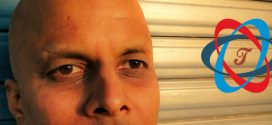Recently we got a chance to interview Joan Weston, a talented writer who is better known by her pen name “Maya Kavita”. She lives in Toronto, Canada. We found her a humble person who have a clear vision in her mind. At one end she is very detailed when it comes to responding the question and at the same time she is clear about what she wants to talk about. These days when people are just trying to have opinion about anything, even if they don’t know about it, it is very respectful quality.
It is said that experience is the best teacher; and Maya has a remarkable experience in the field of Information Technology or IT industry. She thus found very authoritative when explores the world of Outsourcing and IT in her book.

Maya Kavita – Author of TGT Murders Book Series
In her own words:
Although my education was in Journalism and History, I spent my career in the IT industry. I spent many of those years in an HR job at a large multinational company, and part of my job was to help our executives downsize in order to stay competitive. Although I no longer do that type of work, I write from my experiences and from the experiences of many people who have shared their professional stories with me over the years.
Here we present the complete interview of Maya Kavita.
I didn’t always work in the Human Resources department. I was a technical writer at first and then a manager. For the last half of my carer, I did HR work, across all areas of HR. The most important thing I learned about HR from that experience is that the HR department is an arm of the Finance department in most companies – in other words, my job was to save the company money and maximize productivity. HR is not a “people” job as a lot of employees think.
The role of HR is to maximize the output of the workers at the lowest cost to meet the goals of the business – workers are important to a company always, and only, as a number on the balance sheet for the accountants.
When I began reading thrillers about 15 years ago, I noticed that the books I enjoyed most were written by writers like Kathy Reichs, Patricia Cornwell, Tess Gerritsen, and John Grisham, authors who had the same real life professional experience as their heroes or heroines. At some point, I thought, “I bet I could do that. I could write a thriller with a heroine who is an HR manager like me.” That’s when I began to think about writing in a serious way.
Yes, it’s true that many years ago I read in a blog by author Ted Dekker that he wasn’t able to find a publisher until he wrote 3 books. Many publishers want to know that you’ll be capable of writing more than one book because of the upfront investment they make in promoting you. Publishing contracts are often structured around the writing of 3 or more books. Publishers, or even literary agents, don’t have to take the same level of risk if they can see a body of work, and at the very least be sure that the author will actually deliver it. As a new and unknown writer, I was unable to find a publisher as I was working on the trilogy so I self-published as each of the books was finished. Once all three were completed, although it was by no means automatic, I was able to find a literary agent who read all three books and liked my work enough to take me on, and he in turn found me a publisher.
I suppose that the technical subject matter is the challenge that might prevent a writer from taking it on. If you’re going to write about technology, you have to be pretty knowledgeable in order to be credible, and because of the fast pace of change in IT you run the risk that your work will be out of date technically-speaking almost as soon as it’s written. My favourite book with a setting in IT is the 1994 novel Disclosure by Michael Crichton. (By the way, in my opinion, he was able to capture the politics of the IT business.) But it came out a generation ago and the technology wouldn’t seem too interesting if I was reading it for the first time now. Still, because the plot is so strong, the technology hardly matters.
I think you have to be careful when writing about any complex subject, such as medicine, science, or IT, not to get too bogged down in the details of the subject matter. Making IT my setting was an obvious choice for me but I made sure that you didn’t have to know anything about the IT business to enjoy the books.
When I was a manager and afterwards when I worked in HR, every year brought an increase in the number of people the company wanted to let go. It seemed that the case to fire people was a less expensive option than retraining and reassigning them within the company. As you’ve said, this process was hard on the people who had to choose who would be fired and who then had to meet with the employees and give them the bad news. Of course, it was often devastating to the people who lost their jobs. But as time went by, and job security became extinct, people were conditioned to go to work every day knowing it could be their last.
Towards the end of my HR career, every meeting I had with an employee started with them expressing relief that our meeting was a normal business one, that they hadn’t been called to my office on false pretences and that they were really there to hand over their badge and be walked to the door. It’s shameful to see that it got easier to let people go simply because they each knew such a day was almost inevitable. So after a while, the bad news was hardly ever a surprise.
On the day you were firing someone, you’d set up a meeting with them in your office, hand them a folder with official paperwork (this became known generically as a “package”), take their badge, walk them to their workstation to collect their personal belongings, then escort them to the door and out of the building. Each company has a slightly different process but basically, these are the steps. You’ve probably heard the expression, “It’s not personal”. That’s how the company treats the process. But of course, the whole experience is as personal as it gets for the employee who was valued and respected the day before and who suddenly feels as though they’re being thrown out with the garbage.
As you can imagine, up until the day that a person is dismissed they’re just going on with their normal lives so the financial impact of losing their job can be significant. Some unfortunate people may have just bought a house and taken on a mortgage. Some people may have brought their elderly parents to live with them. Some may have recently had babies. Many are the sole breadwinner in their family.
People react differently. Some have actually expressed relief that the stress of waiting to be let go has at last been lifted. Some cry. And as you may be guessing, some responses are much more drastic. Being terminated in this way is altogether both financially disruptive and emotionally traumatic.
I coped by writing Outsourced! Coming home after work and spending a few hours writing was a major outlet for me, a kind of emotional secret weapon. Also, I have a terrific personal life and I deliberately never let my career interfere with it. Because of my work in HR, I knew better than some people did that I too could be fired on any given day. I knew that although I was the one firing people, I was nonetheless a pawn of the system. A great stress came from knowing that I too could be on some executive’s hit list. But really, when someone at the top of the company was coming up with the number of people who had to be let go at least twice yearly, even the process of choosing them and firing them became simply business as usual.
I think that once you’ve accepted capitalism as your economic philosophy, outsourcing is a reasonable approach to improving competitiveness, although it’s never the only approach. My main issue with outsourcing is that the people who lose their jobs are not the ones responsible for getting the company into the position that required the jobs to be outsourced. It’s always the junior people who were just doing their jobs who end up on the street. The executives who either weren’t willing to run the company any other way, or didn’t know how to run a company differently, were the ones who made the decision to outsource. And it was always a decision, not the only choice. Outsourcing was all positive for them. Personally, they were rewarded financially when the business results improved. Professionally, they didn’t have to face the people they’d worked with, one on one, to fire them, and they were able to “improve their hand” as the expression went – to hire some new people with more competitive skills. Yes, all through the time we were outsourcing, we were also hiring.
I love them all, of course, but Ella Laraway has to be my favourite. I love how she grows as a person. I love her honesty and most of all, I love that once she realizes she’s been wrong in her life, she shows her remorse in a genuine way by changing direction.
As I said earlier, writing my first book Outsourced was a kind of therapy for me. It took a long time to write and midway through, I realized that I wanted to go further. Pretty soon the ideas for the second and third books came to mind. Then I read Ted Dekker’s advice about writing 3 books and I decided that if I had enough interest and energy after Outsourced, I’d commit to myself to write two more.
I like Daphne DuMaurier a lot. And The Harry Potter series. I really like to keep up with John Grisham‘s work. And Lee Child’s. I read pretty broadly but any fiction I read must have a strong storyline or I can’t get past the first chapter. That’s why I enjoy Dan Brown‘s books. He’s a great storyteller. I remember that I was on page 50 of The Da Vinci code and I realized that I had almost forgotten that I was reading, I’d been completely swept into the story.
I loved Rebecca by DuMaurier, The Source by James Michener, The Narnia Chronicles by C.S. Lewis. But many others as well, across other genres.
I’m reading a couple of books just now. I’m rereading George Orwell’s 1984, but in French this time.The second book I’m reading is The Climb by Anatoli Boukreev, a first-hand account of the 1996 disaster on Mount Everest. I’ve lately been reading a lot of mountaineering biographies and recommend them as adventure stories that are made even more compelling because they’re true.
When I was writing Outsourced, I wrote after work every evening and for some period of time every weekend. I felt that I had to write every day. I do many rewrites, so the process is time-consuming for me. By the time I was working on Make Believe and The Shortlist, I had retired from IT and I was able to write for several hours every day. I never forced myself and I had no publisher pushing me for deadlines so it was a real pleasure. I labor over every word. And I tend to read large sections aloud because I learn a lot about the flow and pace of the prose that way.
I enjoyed writing the climax near the end of Outsourced. I wanted the reader to feel right along with Ella that she had no hope of rescue. The location of that scene is very familiar to me and I wanted to convey how small and meaningless Ella felt in the light her surroundings but also because of her own mistakes. I worked hard at the pace of the story there and to come up with a solution to her dilemma that was a “girl’s” solution, something simple and credible that any woman could have done in Ella’s place.
In Make Believe, one of my favourite scenes was in the restaurant in the inn when the CEO is being interviewed. I enjoyed being in the minds of both parties.
In many ways, The Shortlist is my favourite book because I felt free to take the story anywhere it needed to go. I didn’t have to position anything in the plot for a follow-on book. I can say this much to whet your appetite: Just as a lot happened to the characters between a href=”/books/outsourced-by-maya-kavita-book-review/” title=”Outsourced | Book Review”>Outsourced and Make Believe, the same is true between Make Believe and The Shortlist. This final book is my take on a locked-room mystery and the whole story occurs on an island. The Shortlist is about a group of women placed in an impossible situation, and forced to fend for themselves. It’s about what’s most important in life, and it’s Ella Laraway’s finest hour.
I have two new books underway, both thrillers. But neither is very far along and I’m thinking through how I want to proceed. I have to be convinced one of the stories is gripping and worth telling before I’ll spend much more time developing it.
We travel frequently. And I garden in the summer and I always have a knitting project on the go, I’m learning sudoku, and I’m trying to brush up on my French (reading 1984 in French is part of that effort).
Canada has many beautiful places. My favourite is probably the Charlevoix area of the province of Quebec. Here’s a link to wikipedia if you’d like to check it out https://en.wikipedia.org/wiki/Charlevoix
Internationally, I love Spain, especially Barcelona. The architecture is unique and the climate is perfect.
I suppose that I’d be so happy if the books became a TV series or a movie that I wouldn’t care who played the parts. Still, for they key characters I think I’d prefer unknown actors who could become established in my stories and ever after be known in the public memory as Ella and Ridley. Also, I’d like to see the same diversity among the cast members as there is in the books.
However, to answer your question, if I had to choose among well-known actors I’d pick:
Sandra Bullock for Ella – Ella should have a vulnerable look to her and I think Sandra has that look as well as an inner strength that she always brings to her characters through her acting. I think that Ella is a Sandra Bullock kind of role.
Benedict Cumberbatch for Ridley – Ridley should seem nerdy and relatively uninteresting on first impression and for me Benedict becomes attractive and multi-dimensional only later in a movie as he develops the character he’s playing. He’s capable of taking over any scene he’s in, and that’s Ridley for sure.
There’s a lot of noise online about a lot of products and it’s hard to know whose opinion to trust.
I don’t think it’s possible to guarantee you’ll be heard no matter what you do to market and promote. Even in a digital world, the successful newer authors that I’ve met are still making the effort to meet readers in person and communicate as individually as possible. Bloggers like you are the closest we can come to that personal touch in a global market. But in the end, I think that a good book will have to sell itself – The Harry Potter series is a perfect example where that happened – the books first became popular by word of mouth among school children.
No I haven’t considered a trailer yet. Once the whole trilogy is available, I’ll be in discussion with my literary agent and publisher about marketing.
- Outsourced
- Make Believe
- The Shortlist (Yet to be published)
Outsourced: TGT Murders (Book1): Buy From Amazon India
Outsourced (TGT Murders Book 1): Buy from Amazon.com
Make Believe: TGT Murders (Book2): Buy From Amazon India
Make Believe (TGT Murders Book 2): Buy from Amazon.com
We hope that you have enjoyed the interview session, may be even more than us 🙂
Do you have any other questions for her? Which other authors you like us to interview for you? Do let us know your thoughts and remarks via comments below. Do not forget to share this article with your friends over various social networks via Twitter, Facebook, Google Plus and others. And yes, you may like to subscribe to our RSS feeds and follow us on various Social networks to get latest updates for the site to land right in your mail box.
 ThinkerViews – Views And Reviews Personal views and reviews for books, magazines, tv serials, movies, websites, technical stuff and more.
ThinkerViews – Views And Reviews Personal views and reviews for books, magazines, tv serials, movies, websites, technical stuff and more.



